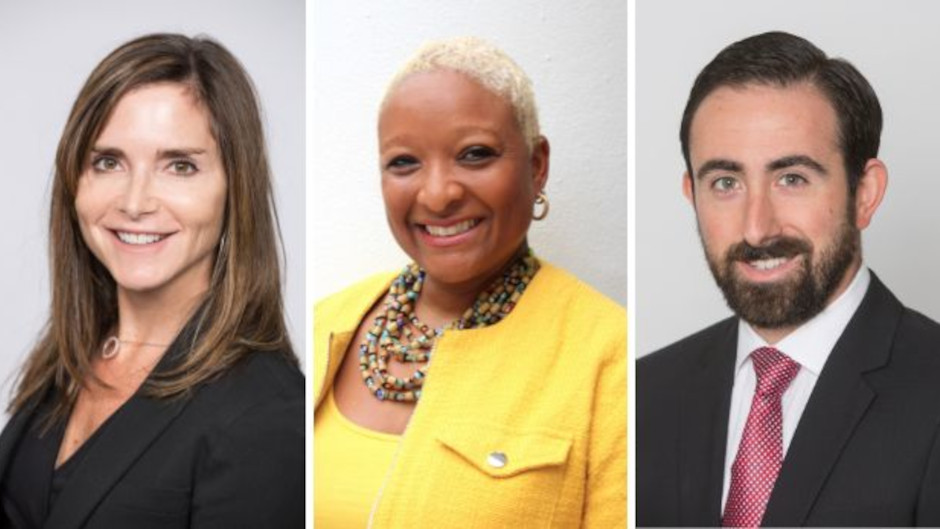A cohort of staff and faculty members selected as the University of Miami’s Presidential Academic Innovation Fellows are working over the semester toward crafting novel degree tracks that revolutionize the way students study and learn in the coming years. With Miami Law's expertise in intellectual property, technology law, and business law, it is no surprise three faculty and staff members with expertise in these areas are part of this group.
Some of Miami Law’s most forward-leaning thinkers – Marcia Nadine Weldon, Michelle DeStefano, and Greg Levy – were among the fellows selected by President Julio Frenk and Jeffrey Duerk, executive vice president for academic affairs and provost. The group of innovative faculty are working on developing the New Century Education Incubator program in “Innovation, Technology, and Design.”
“The world of work is transforming at a rapid pace,” said Professor Michele DeStefano, who was recently named the Larry J. Hoffman, Greenberg Traurig Distinguished Professor in the Business of Law. “Tomorrow’s graduates need to be cross-competent business leaders with excellent creative, collaborative problem finding and solving skills who delight clients by approaching service with the mindset, skillset, and behaviors of innovators, who develop solutions with an understanding of technology and design. To fill this need, the academic innovation fellows created a new University-wide B.S. degree program in Innovation, Technology is truly disciplinary in nature including analytic frameworks, theory and teaching from four schools at the U: Engineering Business, Arts & Science, and Communication. Unlike that of the traditional single-school major, students will gain a holistic and systematic approach to problem-solving that is critical for the environment, social and governance challenges facing large corporations and nonprofits alike.”
The fellows meet weekly to create a proposal for a groundbreaking undergraduate endeavor that will appeal to students well into the future.
As part of the University’s strategic plan, the Roadmap to Our New Century, the fellows represent part of a more significant focus on educational innovation encouraged by Frenk in his recent State of the University address.
The three fellows are uniquely positioned to add high value to the undertaking.
DeStefano is a professor in the School of Law and is an affiliated faculty member of Harvard Law School and IE University. DeStefano’s work focuses on the intersections between law, business, and innovation. In 2010, DeStefano founded the nonprofit LawWithoutWalls. This think tank pairs graduate students in business and law from all over the world with businesses and law firms to solve problems in the industry. She also recently co-created the Digital Legal Exchange, a nonprofit designed to inspire lawyers to become digital leaders in their businesses.
Weldon is a director of the Transactional Skills Program, and faculty coordinator of the Business Compliance & Sustainability Concentration.
Before coming to Miami Law, she worked at the Ryder Corporation as its vice president and deputy general counsel, vice president of global compliance and business standards, and chief privacy officer — supervising global compliance, business ethics, privacy, government relations, environmental compliance, and other areas.
In his strategic initiatives role, Greg Levy, associate dean for Academic & Student Services and Strategic Initiatives assists with researching, analyzing, planning, and implementing new programs and systems to enhance Miami Law. His work has included online education, developing a new transactional skills program, developing and implementing a summer legal academy, co-development of a new course catalog, CourseLink, and the development and implementation of multiple strategic international partnerships. He is also the Director of the LL.M. in Entertainment, Arts and Sports Law.
“We have learned a great deal about education over the last 19 months, and now we want to be on the front of the wave to revolutionize the undergraduate experience, so that students will leave the University prepared for careers that are not even defined yet,” said Duerk. “This is an opportunity to ask faculty to think and work intentionally outside of the box, and many of these fellows have been fearless in reshaping the classroom experience for our students, so their guidance will be invaluable.”
Upon the fellows’ completion of a degree framework, it will go through the appropriate University review and approval processes.
The first cohort of fellows was announced in November 2021 and a second cohort, which included Dean Levy, was added in February 2022.
“Just as we continually develop new treatments in our academic health system, test them, and then incorporate the most effective cutting-edge approaches into our standard of care to better serve patients, we must intentionally cultivate a student-focused approach to the structure and delivery of curriculum,” said Frenk. “The world is rapidly changing, and we are deliberately accelerating the pace at which we drive innovation in the classroom. This is what leading the educational revolution looks like.”
More on Innovation at Miami Law in Intellectual Property Law, Technology Law, and Business Law

